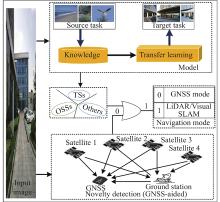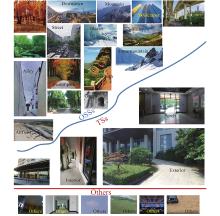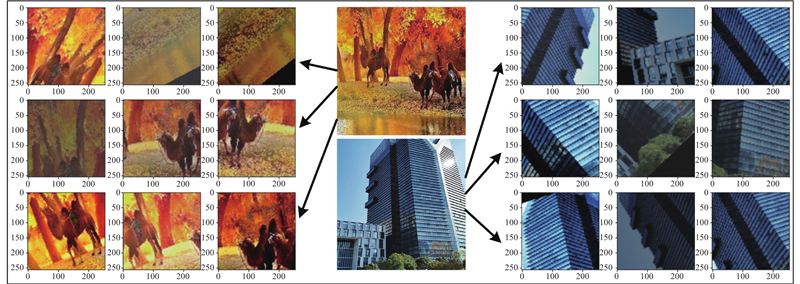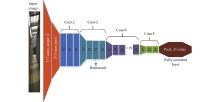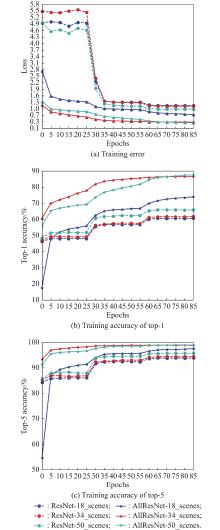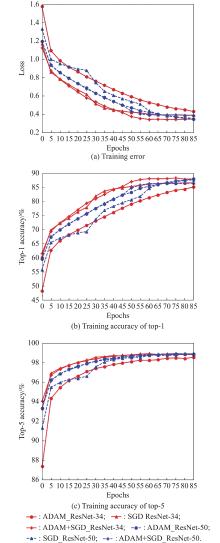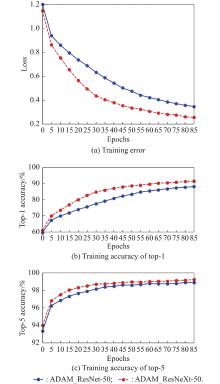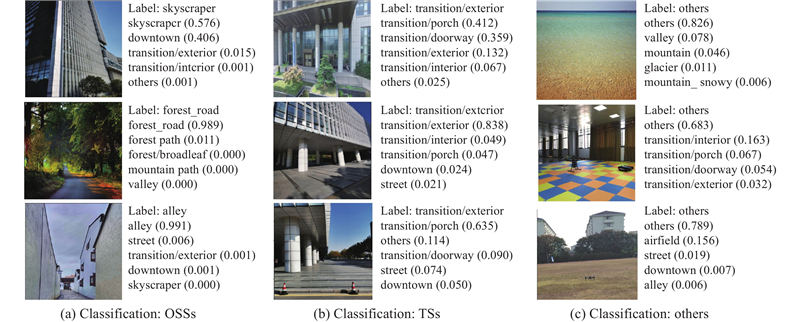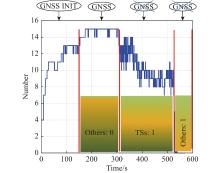| 1 |
LI B Q, HU X H Effective distributed convolutional neural network architecture for remote sensing images target classification with a pre-training approach. Journal of Systems Engineering and Electronics, 2019, 30 (2): 238- 244.
doi: 10.21629/JSEE.2019.02.02
|
| 2 |
LU C W, TSOUGENIS E, TANG C K Improving object recognition with the l-channel. Pattern Recognition, 2016, 49, 187- 197.
doi: 10.1016/j.patcog.2015.06.007
|
| 3 |
GIRSHICK R. Fast R-CNN. Proc. of the IEEE International Conference on Computer Vision, 2015: 1440−1448.
|
| 4 |
REN S Q, HE K M, GIRSHICK R, et al Faster R-CNN: towards real-time object detection with region proposal networks. IEEE Trans. on Pattern Analysis and Machine Intelligence, 2017, 39 (6): 1137- 1149.
doi: 10.1109/TPAMI.2016.2577031
|
| 5 |
REDMON J, FARHADI A. Yolov3: an incremental improvement. https://doi.org/10.48550/arXiv.1804.02767.
|
| 6 |
REDMON J, FARHADI A. Yolo9000: better, faster, stronger. Proc. of the IEEE Conference on Computer Vision and Pattern Recognition, 2017: 6517−6525.
|
| 7 |
MA Y L, WANG C Y. Sdcnet for object recognition. Computer Vision and Image Understanding, 2022, 215: 103332.
|
| 8 |
WU X W, SAHOO D, HOI S Recent advances in deep learning for object detection. Neurocomputing, 2020, 396, 39- 64.
doi: 10.1016/j.neucom.2020.01.085
|
| 9 |
ZOU Z X, CHEN K, SHI Z W, et al. Object detection in 20 years: a survey. Proceedings of the IEEE, 2023, 111(3): 257−276.
|
| 10 |
LI Y L, WANG S J, TIAN Q, et al Feature representation for statistical-learning-based object detection: a review. Pattern Recognition, 2015, 48 (11): 3542- 3559.
doi: 10.1016/j.patcog.2015.04.018
|
| 11 |
ZHANG X G, MA D X, YU H, et al Scene perception guided crowd anomaly detection. Neurocomputing, 2020, 414, 291- 302.
doi: 10.1016/j.neucom.2020.07.019
|
| 12 |
YANG J F, ZHANG S S, WANG G H, et al Scene and place recognition using a hierarchical latent topic model. Neurocomputing, 2015, 148, 578- 586.
doi: 10.1016/j.neucom.2014.07.005
|
| 13 |
ESLAMI S M A, REZENDE D, BESSE F, et al Neural scene representation and rendering. Science, 2018, 360 (6394): 1204- 1210.
doi: 10.1126/science.aar6170
|
| 14 |
SIMONYAN K, ZISSERMAN A. Very deep convolutional networks for large-scale image recognition. https://doi.org/10.48550/arXiv.1409.1556.
|
| 15 |
XIE L, LEE F F, LIU L, et al Scene recognition: a comprehensive survey. Pattern Recognition, 2020, 102, 107205.
doi: 10.1016/j.patcog.2020.107205
|
| 16 |
ZENG D L, LIAO M Y, TAVAKOLIAN M, et al. Deep learning for scene classification: a survey. https://arXiv.org/abs/2101.10531.
|
| 17 |
ZHANG X W, WANG L, SU Y Visual place recognition: a survey from deep learning perspective. Pattern Recognition, 2021, 113, 107760.
doi: 10.1016/j.patcog.2020.107760
|
| 18 |
ZHOU B L, LAPEDRIZA A, KHOSLA, et, al Places: a 10 million image database for scene recognition. IEEE Trans. on Pattern Analysis and Machine Intelligence, 2018, 40 (6): 1452- 1464.
doi: 10.1109/TPAMI.2017.2723009
|
| 19 |
NEYSHABUR B, SEDGHI H, ZHANG C. What is being transferred in transfer learning? Proc. of the 34th Conference on Neural Information Processing Systems, 2020: 512−523.
|
| 20 |
HE K M, ZHANG X Y, REN S Q, et, al. Deep residual learning for image recognition. Proc. of the IEEE Conference on Computer Vision and Pattern Recognition, 2016: 770−778.
|
| 21 |
XIE S N, GIRSHICK R, DOLLAR P, et al. Aggregated residual transformations for deep neural networks. Proc. of the IEEE Conference on Computer Vision and Pattern Recognition, 2017: 5987−5995.
|
| 22 |
STEGER C, ULRICH M, VIEDEMANN C. Machine vision algorithms and applications. New Jersey: Wiley-VCH GmbH, 2018.
|
| 23 |
THEODORIDIS S, KOUTROUMBAS K. Pattern recognition. 4th ed. Boston: Academic Press, 2009.
|
| 24 |
XIE P, PETOVELLO M G Measuring GNSS multipath distributions in urban canyon environments. IEEE Trans. on Instrumentation and Measurement, 2015, 64 (2): 366- 377.
doi: 10.1109/TIM.2014.2342452
|
| 25 |
BRIDLE J S. Training stochastic model recognition algorithms as networks can lead to maximum mutual information estimation of parameters. Proc. of the Advances in Neural Information Processing Systems, 1990: 211−217.
|
| 26 |
QIAN N On the momentum term in gradient descent learning algorithms. Neural Networks, 1999, 12 (1): 145- 151.
doi: 10.1016/S0893-6080(98)00116-6
|
| 27 |
SUTSKEVER I, MARTENS J, DAHL G, et al. On the importance of initialization and momentum in deep learning. Proc. of the 30th International Conference on Machine Learning, 2013: 1139−1147.
|
| 28 |
KINGMA D, BA J. Adam: a method for stochastic optimization. Proc. of the 3th International Conference on Learning Representations, 2015. https://doi.org/10.48550/arXiv.1412.6980.
|
 ), Wei WANG2,3(
), Wei WANG2,3( ), Xuerao WANG1(
), Xuerao WANG1( ), Jingqiu ZUO2(
), Jingqiu ZUO2( ), Yuanda WANG1,*(
), Yuanda WANG1,*( )
)
